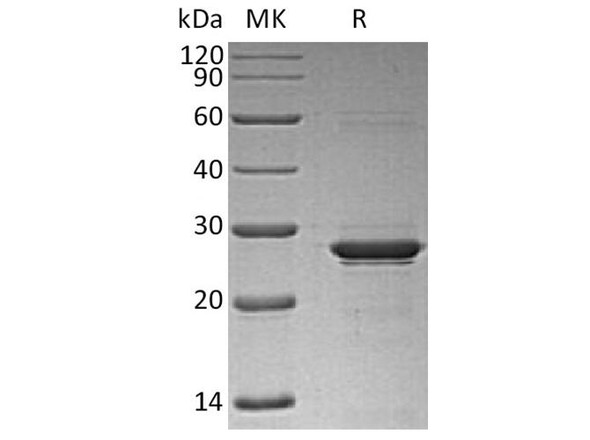Human Oncostatin M/OSM Recombinant Protein (His tag)
- SKU:
- RPES5989
- Product Type:
- Recombinant Protein
- Species:
- Human
Frequently bought together:
Description
| Product Name: | Human Oncostatin M/OSM Recombinant Protein (His tag) |
| Product Code: | RPES5989 |
| Size: | 20µg |
| Species: | Human |
| Expression Host: | HEK293 Cells |
| Synonyms: | Oncostatin-M, OSM |
| Mol Mass: | 24.2 kDa |
| AP Mol Mass: | 35 kDa |
| Tag: | C-His |
| Purity: | > 95 % as determined by reducing SDS-PAGE. |
| Endotoxin Level: | Please contact us for more information. |
| Bio Activity: | Testing in progress |
| Sequence: | Met1-Arg221 |
| Accession: | P13725 |
| Storage: | Generally, lyophilized proteins are stable for up to 12 months when stored at -20 to -80°C. Reconstituted protein solution can be stored at 4-8°C for 2-7 days. Aliquots of reconstituted samples are stable at < -20°C for 3 months. |
| Shipping: | This product is provided as lyophilized powder which is shipped with ice packs. |
| Formulation: | Lyophilized from sterile PBS, pH 7.4. Normally 5 % - 8 % trehalose, mannitol and 0.01% Tween80 are added as protectants before lyophilization. Please refer to the specific buffer information in the printed manual. |
| Reconstitution: | Please refer to the printed manual for detailed information. |
| Background: | Oncostatin M (OSM) is a glycoprotein belonging to the interleukin-6 family of cytokines that includes leukemia-inhibitory factor, granulocyte colony-stimulating factor, and interleukin 6. OSM encodes a growth regulator, which Inhibits the proliferation of a number of tumor cell lines. It stimulates proliferation of AIDS-KS cells. OSM regulates cytokine production, including IL-6, G-CSF and GM-CSF from endothelial cells. OSM is considered as a pleiotropic cytokine that initiates its biological activities through specific cell surface receptors. The low affinity LIF receptor that shares the similarity of containing protein gp130 has now been identified to be a component of a high- affinity OSM receptor that will transduce OSM signals. OSM has also been shown to play a role in both pro and anti-inflammatory actions. OSM may also be involved in many biometabolism processes including liver development, haematopoeisis, inflammation, bone formation and destruction and possibly CNS development. |









